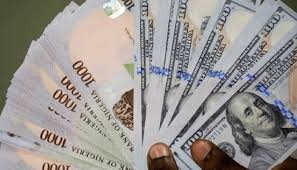The Nigerian naira recorded a slight appreciation against the United States dollar on Thursday at the official foreign exchange market, as the country’s external reserves rose to a four-year high of $41.00 billion. The Central Bank of Nigeria (CBN) confirmed the development in its latest data, showing a stronger position for the nation in defending its currency and boosting market confidence.
Figures released by the CBN indicated that reserves climbed to $41.00 billion on August 19, 2025, up by $4.53 billion or 12.42 percent when compared with $36.47 billion on the same date in 2024. The last time reserves were at this level was on March 12, 2021, when they reached $41.08 billion.
At the close of trading on Thursday, the naira appreciated slightly by 95 kobo, with the dollar quoted at N1,535.78 compared to N1,536.73 on Wednesday at the Nigerian Foreign Exchange Market (NFEM).
In the parallel market, the naira held steady at N1,545 per dollar. Guaranty Trust Bank (GTBank) also kept its foreign exchange rate for international transactions stable at N1,543, after adjusting from N1,545 earlier in the week.
A market report by United Capital explained that the naira gained 1.4 percent in July 2025, moving from N1,552/$1 in June to N1,530/$1. The report also confirmed that the gap between the official and parallel market exchange rates has remained narrow, a sign of better stability.
The growth in Nigeria’s external reserves has been attributed to several factors. These include reforms introduced by the Central Bank in the FX market, improved diaspora remittances, stronger inflows from foreign investors, increased crude oil production, and a reduction in oil theft and losses. These combined efforts have helped to improve liquidity in the market, support the naira, and ensure gradual appreciation.
According to United Capital analysts, the reserves level, which now covers over 9.5 months of imports, represents a significant improvement compared to previous years. The analysts stressed that a stronger reserve base is critical for stabilising the naira and maintaining investor confidence, especially at a time of global economic uncertainty.
FBNQuest, another financial advisory firm, noted that the increase gives the CBN greater flexibility in managing exchange rates and intervening when necessary to ensure liquidity. “The notable boost in reserves strengthens the Bank’s ability to provide support to the market and maintain relative stability,” the firm explained.
Balance of payments data from the CBN shows that as of July 2025, Nigeria’s gross reserves could cover 11.9 months of merchandise imports and 8.2 months when including services. This level is considered relatively strong and serves as a buffer for the economy.
The recent momentum has also been supported by carry-trade opportunities in Nigeria’s fixed-income market, which remain attractive to foreign portfolio investors. Improved macroeconomic conditions, policy reforms, and reduced demand for foreign exchange from importers and consumers have further eased pressure on the reserves.
Analysts believe that the month-on-month increase is a sign of renewed investor confidence in Nigeria’s financial markets. Offshore inflows are expected to continue, while upcoming external borrowings could further boost the country’s reserve position before the end of the year.
Financial experts predict that Nigeria’s gross reserves could climb to around $40.1 billion by December 2025, depending on market conditions and government policies. They added that sustaining the momentum would require ongoing discipline in FX management, as well as stronger productivity in sectors beyond oil to maintain stability in the long term.
The slight appreciation of the naira, coupled with stronger external reserves, has been welcomed by market observers as a positive sign for Africa’s biggest economy. However, they warned that Nigeria must remain cautious in balancing FX reforms with local business realities, as exchange rate volatility still poses risks to import-dependent sectors.
With the CBN’s continued intervention, diaspora remittances, foreign investment inflows, and steady crude oil earnings, Nigeria’s reserve outlook appears promising, giving policymakers more tools to defend the naira in the coming months.
